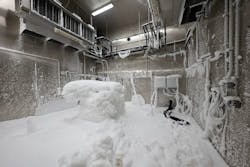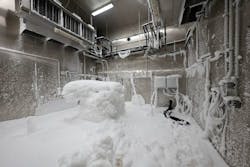Johnson Controls Expands, Upgrades Wichita Testing Lab
MILWAUKEE , Wisc. — Johnson Controls has significantly upgraded the testing lab facilities at its residential HVAC manufacturing plant in Wichita, Kan.
The nearly $15 million investment includes the addition of seven test chambers, automated testing and model shop equipment, and a new building, which adds 2,000 more square footage, bringing the plant’s total testing facility space to 100,000 square feet. Every product that the Wichita factory designs and manufactures undergoes multiple rigorous tests at the lab to ensure it operates safely and efficiently across a wide range of conditions for years to come.
Johnson Controls voluntarily performs highly accelerated life testing (HALT), which subjects equipment to extreme environmental conditions that replicate five years in the field, yet there is other testing that the government requires for all residential HVAC systems to ensure product safety, efficiency and environmental“When visitors tour the lab, they are simply overwhelmed by the extensive steps that we take to ensure each and every system developed in the labs are tested to ensure performance and reliability,” said Doug Dorrough, director of lab operations, Johnson Controls. “The greater efficiency and unprecedented quality we can now achieve with this major investment will bring our premier products to market sooner and provide homeowners with enduring comfort and peace of mind.”
The upgrades coincide with new efficiency standards, including the 2023 Department of Energy (DOE) efficiency standards and environmental sustainability requirements, including the Environmental Protection Agency’s (EPA) low-global warming potential (GWP) refrigerant transition that will be required of all HVAC equipment manufactured by January 1, 2025. Sources report the expanded lab will better accommodate product development and testing schedules to ensure that each product meets or exceeds all requirements, as well as the high-quality standards Johnson Controls holds for its equipment. Johnson Controls will continue to invest in and expand the testing facilities in Wichita, Kan. over the next several years with new equipment and additional facilities to accommodate new product development and testing.


